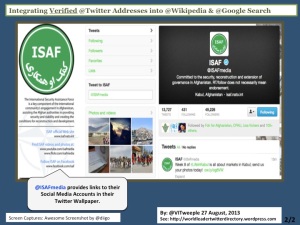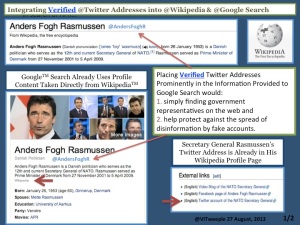Presto! It’s @AndersFoghR: Integrating Verified Twitter Accounts into Wikipedia and Google Search
“A Single Tweet Can Cause Major Economic Disruptions.”
Clearly we all rely on information from authenticated sources to make a myriad of decisions in our daily lives. And the ‘New Electronic Social Media’ are rapidly becoming essential information hubs in the realm of global public discourse. The daily news is filled with reports of what politicians are posting on Twitter, Facebook, and the like. The potential for the New Social Media to transform how we interact with one another as citizens and to enhance the effectiveness of public diplomacy by governments is profound.
In a June Op-ed posted in the Wall Street Journal (@wsj), Secretary General Anders Fogh Rasmussen (@AndersFoghR) introduced NATO’s (@NATO) new cyber security program (@ccdcoe). He began by pointing out, “A single tweet can cause major economic disruptions (1,2).” He was commenting on the after effects of a ‘hack’ of the @AP‘s @Twitter account. The AP’s compromised Twitter account released a false report that the @Whitehouse had been bombed. In response, the Dow Jones temporarily lost some $150 Billion in value. This one report is a strong indication that, ‘What Happens in the Twittersphere Does Not Stay in the Twittersphere!’ But rather can have far-reaching impacts.
In 2011, a fake Twitter account, imitating the identity of Chicago’s Mayor Rahm Emanual, was able to fool journalists and the public for several weeks (3). And more recently in January 2013, an imposter account “@SurkovRussia,” purporting to be that of then Russian Deputy Prime Minister Vladislav Surkov, even had his friends fooled (4).
Social Media are literally rife with fake and parody accounts that mimic the identity of public officials. These accounts cause confusion, make it difficult for citizens to contact their appropriate representatives in government, and obviously hold the potential to cause more disruptions in the social fabric by spreading false and misleading information.
In response to the recent cyber attacks, @Twitter has implemented a new two-step log-in process (5). It also has had a voluntary verification process in place for several years (6). It is reassuring to see that @Facebook has also finally launched its own version of verified accounts (7).
Given the potential for mischief and abuse, governments, politicians and diplomats need to be proactive in providing some guarantee that the ‘Electronic Social Media Accounts’ they employ are authentic. Journalists and citizens should not be left to guess if a particular Twitter or Facebook, etc., account is legitimate. For all the hype, however, too many politicians and government offices are still not making the effort to appropriately authenticate their Social Media Accounts.
In compiling the “World Leader Twitter and Web Directory,” I have screened through literally hundreds of faux, out-dated, and ‘orphan’ Twitter accounts (8,9). A mere 25% of the 1820+ government and intergovernmental Twitter accounts now curated in the “World Leader Twitter Directory” are @Verified (8). That is, ~75% are still not @Verified by Twitter. Further, many accounts lack a link to an official website in their profile. And too many government websites do not have the appropriate Twitter ‘Widget’ embedded on their pages. These lapses make it very difficult for citizens to connect with their representatives on Twitter (and other Electronic Social Media) and create a void for imposters to fill with false and misleading information (10).
Moreover, Comprehensive Social Media Directories are still rare among government websites. And very, very few governments and politicians on Twitter make use of Twitter Lists to inform the public who among their staff and offices are also legitimately on Twitter.
@Wikimedia is Exploring Ways to More Effectively Support Global Diplomacy: Good Public Diplomacy is Grounded in Accurate Information
On Friday, 21 June, 2013, the Diplo Foundation (@eDiplomat) and the @Wikimedia Foundation hosted a Webinar entitled “Wikimedia for Diplomats” (http://www.youtube.com/watch?v=GNW93rjXu4U) on Google + (@Google, @GooglePlus_Feed). [Wikimedia is the Foundation that supports the free, online, citizen-sourced encyclopedia @Wikipedia.]
Diplo Foundation’s Marilia Maciel (@MariliaM) moderated a discussion among four participants: Diplo Foundations Jovan Kurbalija (@JovanKurbalija); the U.S. State Department’s Director of eDiplomacy (@eDipAtState), Richard Boly (@beaurichly); Director of the Italian Foreign Ministry’s (@FarnesinaPress) Instituto Diplomatico, Stephano Baldi (@diplosor); and Chair of Wikipedia’s Affiliations Committee, Bence Damokos (No Twitter Account Found).
The webinar participants weighed some of the pros and cons of relying on the now voluminous wealth of citizen-sourced information contained within the pages of Wikipedia.org for the purposes of public diplomacy. It was pointed out that Wikipedia.org ranks as the world’s 6th most frequently visited website and offers some 90 million pages of content in over 300 languages (11).
It is encouraging to see Mr. Boly and Mr. Baldi, two government officials influential to digital policy, actively working with the Wikimedia and eDiplomat Foundations as well as eliciting citizen input on the future directions of digital diplomacy.
The essential need for accurate, sourced information as an input to social and public policy making and diplomatic dialogue was central to the panel’s discussion. On behalf of Wikipedia, Mr. Damokos emphasized that Wikipedia’s editors make it clear 1) the quality and accuracy of Wikipedia content can be broadly variable and 2) Wikipedia should be viewed as an introductory, but not a definitive, source of information on the topics it covers. I look forward to future discussions on this topic.
Diplo Foundation invited participants to comment on the live discussion and provide suggestions for improving content quality with regards to Wikipedia and public diplomacy. Here are my suggestions:
One: Integrate Verified @Twitter Addresses Prominently in @Wikipedia and @Google Search Results
Google already provides content verbatim from Wikipedia’s pages in its search results of politicians, prominent individuals and organizations. Also, Twitter addresses are already being entered into Wikipedia Profiles. For example, “Googling” Secretary General Rasmussen would “Presto!” bring up his Verified Twitter account @AndersFoghR along with his photograph and personal data [Slide 1 see above; 14]. No more need to dig and dig on the internet to find a way to directly contact the Secretary General of @NATO!
Qutie simply, providing Verified Twitter account information in this way would 1) make it easier for everyone to find government representatives on the web, 2) help protect against the spread of disinformation by fake accounts and 3) add another level of assurance that a particular Twitter account is authentic. I emphasize that @Verified Twitter accounts ONLY should be used!!!
The advantage of using Twitter account names (as opposed to other Social Media account names) is that they are by necessity short and thus easy to track on the web. Further, Twitter’s uncluttered page layout is extremely user-friendly. When optimized, Twitter Profiles and Pages can provide rapid, direct access to the full ‘Web Presence’ of government departments and elected officials. For example, NATO’s International Security Assistance Force in Afghanistan (@ISAFMedia) uses their Twitter Wallpaper to provide a list of their Social Media Contacts [Slide 2]. Again, no more digging and digging to ‘find’ ISAF’s information streams or a way to directly communicate with ISAF Staff.

Putting your Social Media Links on Your Twitter Wallpaper is a smart way to help you followers connect with you.
Two: Host a Social Media Teach-In Week at the @UN
Perhaps the non-profit Wikimedia and Diplo Foundations would consider hosting an annual ‘Electronic Social Media’ Teach-In at the United Nations in New York. I envision this as a full week of education for both diplomats and citizens that brings together experts in website management, the new ‘Electronic Social Media,’ integrating Social Media tools into websites, cyber security, and effective communication via Social Media. The sessions could be streamed live (using @livestream, @bambuser or the UN’s own live-stream service) and made available on the UN’s @Youtube channel, http://www.youtube.com/user/unitednations. Topics could range from the basics of setting up websites and social media accounts to advanced seminars on how to effectively utilize ‘Electronic Social Media’ to coordinate public advocacy campaigns and engage meaningfully in public discourse and so on.
The ‘Teach-In’ could also serve as a forum for citizen dialogue; a goal fully in line with the UN’s Millennium Development Goals (@wecanendpoverty; @unmdg; @Campagne_OMD; @mcampaign; 12,13 ). Imagine a full week of live-streamed webinars and ‘Twitter Town Halls’ [Yes, yes Google and Facebook can be there as well!] with UN Ambassadors, Diplomats and experts in the diverse Social Media. I am confident many citizens would have much that is constructive to offer in terms of both the structure and substance of public diplomacy and dialogue currently taking place on the varied Electronic Social Media.
I’d gladly tweet with the fine folks at Google, Twitter and Wikipedia to further elaborate on my suggestions! In the meantime, I strongly encourage government departments and public officials to finally, oh finally, get their Twitter Accounts Verified!
Cheers and Kind Regards,
@VItweeple (Yes, it’s me, it’s really, really me!)
1) Twitter accounts in blue are @Verified.
2) via @wsj “NATO’s Next War – In Cyberspace” by Anders Fogh Rasmussen (2 June, 2013) http://online.wsj.com/article/SB10001424127887323855804578508894129031084.html
3) via @TheAtlantic “Revealing the Man Behind @MayorEmanuel” (28 February, 2011) by Alexis C. Madrigal http://www.theatlantic.com/technology/archive/2011/02/revealing-the-man-behind-mayoremanuel/71802/
4) via @JohnsonRussiaLi “Senior Russian Politician says Twitter account is fake, he avoids social media” (15 January, 2013) http://russialist.org/senior-russian-politician-says-twitter-account-is-fake-he-avoids-social-media/
5) via @cnn “Twitter bumps up log-in security after hacks” (23 May, 2013) http://www.cnn.com/2013/05/23/tech/social-media/twitter-security-hacks
6) via @Verified https://support.twitter.com/articles/119135
7) via @Mashable “Facebook Launches Verified Accounts.” (29 May, 2013) http://mashable.com/2013/05/29/facebook-launches-verified-accounts/
8) via @VITweeple “Get Connected to Global Government: The World Leader Twitter and Web Directory” is Here! (V30; 02 Sept, 2013) https://worldleadertwitterdirectory.wordpress.com/2013/09/02/get-connected-to-global-government-world-leader-twitter-and-web-directory-v29-26-aug-2013-is-here/
9) I define an ‘orphan’ Twitter account as one that lacks any connection to an official website in its profile. For example see: @hamadi_ould. Is this this Twitter account of Mauritania’s Foreign Minister Hamadi Ould Hamadi?
10) via @VITweeple “Authenticating Your Twitter Account: A Slideshow” https://worldleadertwitterdirectory.wordpress.com/2013/02/08/authenticating-your-twitter-account-2/
11) via @wikipedia “List of Most Popular Websites” http://en.wikipedia.org/wiki/List_of_most_popular_websites
12) via @amprog “Twitter Town Hall on the Pos-2015 Development Agenda.” http://www.americanprogress.org/issues/poverty/news/2013/05/30/64502/twitter-town-hall-on-the-post-2015-agenda/
13) via @UN “We Can End Poverty 2015: Millennium Development Goals” http://www.un.org/millenniumgoals/
14) All Slide Images Captured with “Awesome Screenshot” by @diigo https://chrome.google.com/webstore/detail/awesome-screenshot-captur/alelhddbbhepgpmgidjdcjakblofbmce

